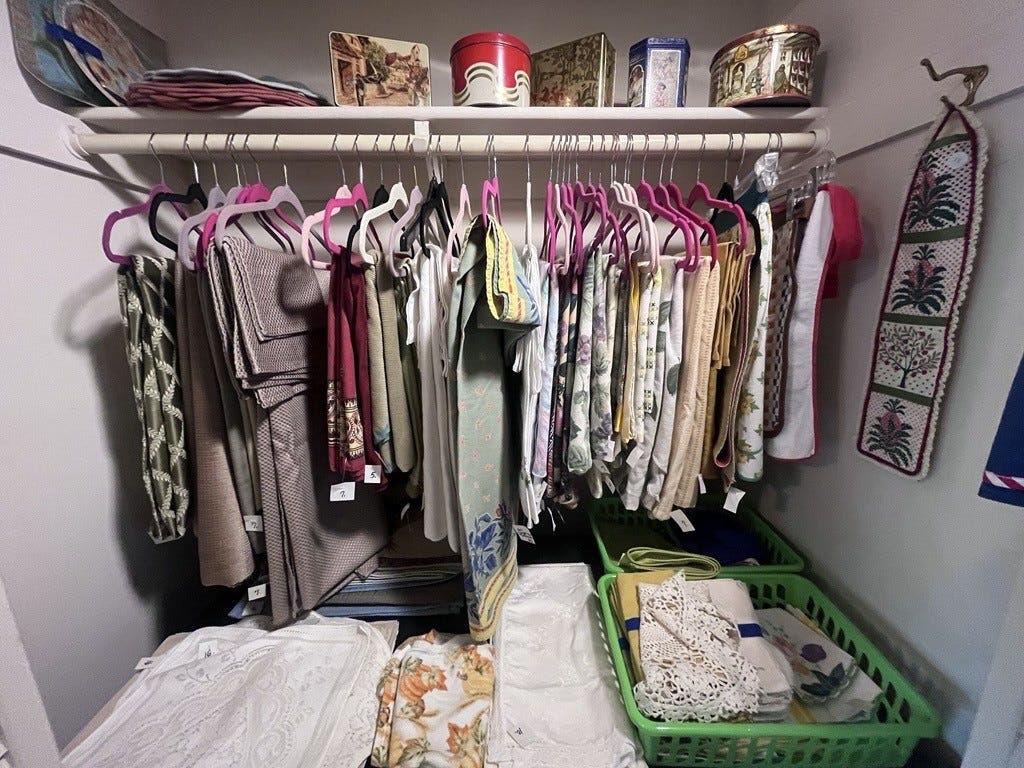Grandma's Junk, Gen Z's Gold: Estate Sales Take Over Trends

The Rise of Estate Sales Among Young Consumers
At noontime on a recent summer Friday, about two dozen cars were parked along a tree-lined cul-de-sac in this suburb 30 minutes outside of the nation’s capital. A blue yard sign directed people to a house at the end of the street with a simple, beckoning message: “Estate sale this way.” Women in their 20s and 30s meandered to their cars carrying cardboard boxes piled high with books, holiday decorations, clothes, and picture frames. Across the country, scenes like this are becoming more common, as young people looking to shop in more sustainable ways are gravitating toward estate sales – rather than large retailers – to find low-cost, well-made products.
A Growing Trend in Sustainable Shopping
In the past six months, the online estate sale marketplace Everything But the House saw a 28% increase in business, with much of that driven by young people, according to Chief Commercial Officer James Ferguson. The company saw an 18% uptick in sales among people aged 25 to 35 in the first half of the year. “There's a concept of quality and value from things that maybe are older or were gently used in a previous life,” he said. “We call it pre-loved. They're seeing the opportunity to get something unique.”
Raquel Sobczak, 25, began attending estate sales after the COVID-19 pandemic to find deals on clothes and trinkets she could use to decorate her house. This year, she said she made a commitment to buy only secondhand goods. Now, the Arlington, Virginia, resident said she attends sales at least two or three times a month. “It’s better for the environment, but it’s also better for my wallet to go and buy stuff secondhand,” Sobczak said, while shopping at a July 18 estate sale.
Gen Z and the Shift to Secondhand Goods
Gen Z consumers’ rising interest in estate sales follows a broader demand among the age cohort over the last decade for thrifted goods. Young people began frequenting resale stores like Goodwill out of a desire to reduce their carbon footprint and shop more sustainably. In 2021 alone, 42% of Gen Z and millennials said they had shopped for secondhand clothes, according to a survey conducted by the online consignment site ThredUp.
Some young people told USA TODAY they are now turning to estate sales after finding the inventory at thrift and vintage shops overrun with fast-fashion and cheap goods. “I know if I'm going to an estate sale, I’m probably going to find real treasures that have been cared for by people,” said 27-year-old Edie Guy, who lives in Mount Vernon, Virginia. “Sometimes you'll find that at thrift shops, but I feel like less and less because everyone and their mother is kind of donating to thrift stores just to get stuff cleaned out of their house.”
The Appeal of Estate Sales
Guy begrudgingly visited estate sales with her mom and grandmother when she was a child, but said she didn’t become interested in them until after college, when she needed to decorate her new apartment. As she and her husband look to furnish their first home, Guy said estate sales have become a life- and money-saver. “The quality you get is unmatched,” she said. “We can get an incredibly high-quality crafted piece for $300, versus something online that was mass produced for like, you know, $5,000.”
Adapting to New Consumer Trends
Some estate sale companies have begun to capitalize on the increased interest from younger generations. EstateSales.net, an online marketplace and directory for in-person estate sales, has taken steps to attract Gen Z and millennial consumers on social media, said General Manager Marika Clemow. “We can appeal more to them in that, not only are you buying something at a fairly decent price that’s durable and long-lasting – but, you're not putting more plastics into the earth,” Clemow said. “This generation is a little more open to items at estate sales, not feeling like old, worn stuff, but being old, reusable stuff.”
Rising inflation and tariff concerns also may have a hand in Gen Z’s new attraction to estate sales. In the past six months, Clemow said she’s seen an uptick in people searching the digital marketplace for durable goods, like furniture, tools, school supplies, and baby ware. Meanwhile, searches for luxury goods, like Rolex watches, have dipped.
A New Perspective on Value
Diane Rotondo, who runs a Blue Moon Estate Sales franchise in Fairfax County, Virginia, said she’s seen a similar demand for furniture. A couple of years ago, Rotondo said she couldn’t get people to buy antique four-poster bedframes and now, young consumers are snatching them up early. “The cost of goods are going up and up and up, and it makes it even more impossible to get the things you like,” Rotondo said. “When you can go to find something that you really like and pay so much less than what you would in a store, it's just a pleasant experience.”
When asked about what she believes is drawing more people to estate sales, Rotondo said: “The adventure.” “It gives somebody the opportunity to treasure hunt in the modern day,” she said. “It’s like a little museum, but you get to purchase it and give it a new journey instead of it ending up in a landfill.”

Posting Komentar untuk "Grandma's Junk, Gen Z's Gold: Estate Sales Take Over Trends"
Posting Komentar